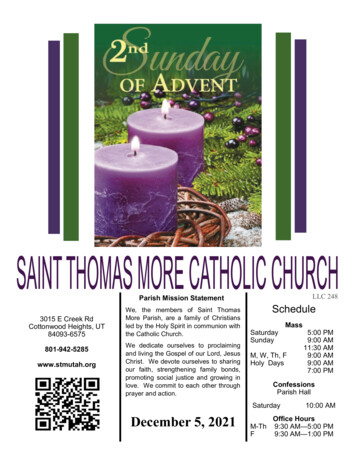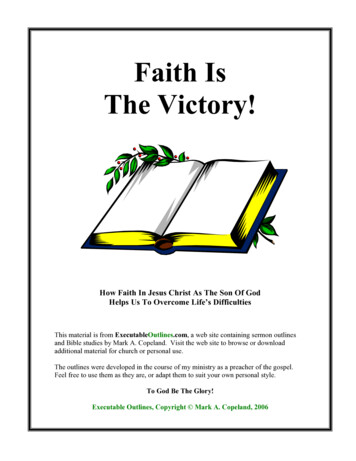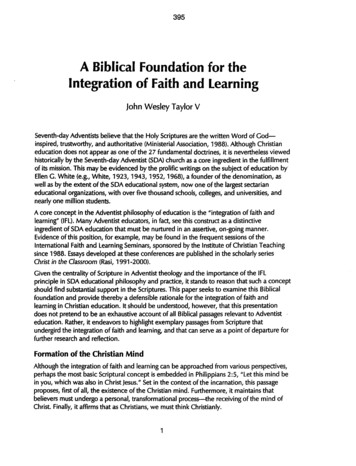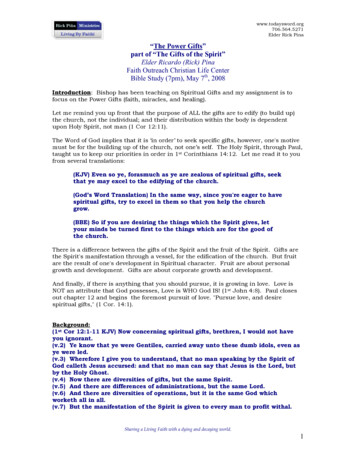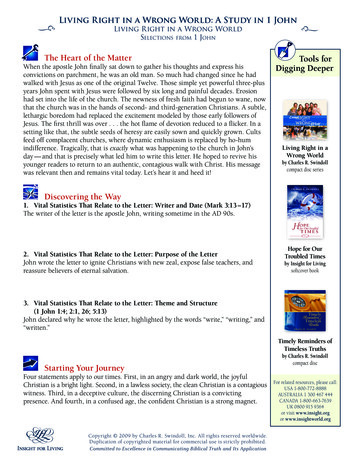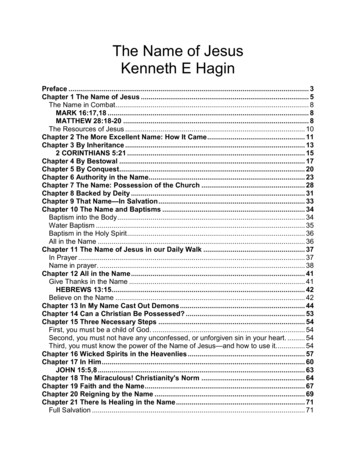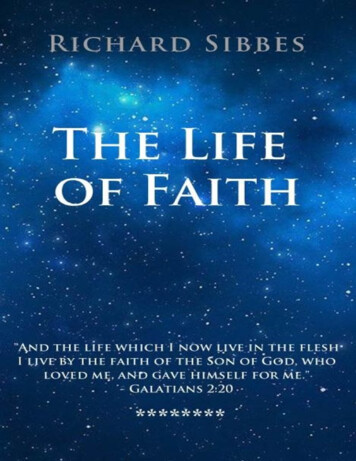
Transcription
Faith: A Study of Hebrews 11ByMatt Dabbshttp://mattdabbs.wordpress.com
Lesson 1 – What is Faith?Hebrews 11:1-2How would you define the word “Faith”?Hebrews 11 is one of the most important chapters on faith in the entire Bible. The chapterstarts with a definition for faith – Read Heb 11:1Faith is partially about belief. In the case of Christian faith, we have faith that God is real, eventhough we have never personally seen God. What does the writer of Hebrews say about faithand things we cannot see?What things help you have faith in God even though you haven’t ever seen him?As we study Hebrews 11 we are going to study the stories of men who knew God verypersonally. Some of them even spoke with God, one on one. What is more, some of them evensaw God and lived to tell about it. This chapter is about their stories and how their story helpsgrow our faith today.When we hear the stories of these people we will see that faith is about what they believed butin each story we see that faith is more than just having the right beliefs.Read James 2:14-22What does James say faith always produces?If you really believe Jesus is the Christ and that he is Lord it changes the way you live. So faith ispartially about belief but it is more than that. It is that belief moved into action.What does James say about the demons who do have the correct belief about God?Being a Christian is more than just having a certain set of beliefs. It is also about the way we liveour lives in this world.Here is a list of beliefs respond with what types of behaviors or actions we take because ofthose beliefs:1. All people are made in the image of God, therefore we treat people2. The word of the Lord is a lamp to our feet and a light to our path, therefore we3. God sent Jesus as a sacrifice for our sins, therefore we4. Jesus is coming back again to judge everyone who ever lived, therefore we
As we study these different people in the Bible we need to listen to how God used them so thatour faith may grow. That growth is more than just having the right beliefs that growth requiresus to lives in line with our beliefs.What does James say about the faith of someone who believes the right things about hisbrother but is not willing to move to action to make a difference for him?Let us be people whose faith moves us to action. Let us meet the needs we see. And last, let uslook at the world around us through the eyes of faith so that we might be able to make thedifference God has put us here to make.Application:Has your Christianity ever just been about your beliefs, but you weren’t really living your life likeit? What happened?/How are things different now?What are some areas of difficulty for your faith?How do you hope that in the coming weeks, this study will address some of those?Prayer time – prayers that God will grow our faith and our dependence on Him.
Lesson 2 – How Creation Grows Our FaithHebrews 11:3When was a time you were out in nature and you saw something so impressive it reminded youthat God is real?God created every single thing you see. He didn’t even have to use his hands to make it all. Godspoke and it all came into existence from nothing.Read Genesis 1:3One the first day of creation God made light just by saying it. What does that teach us aboutGod, that he is able to speak and things are created?Read Hebrews 11:3What did God create the universe out of?Sometimes we say we create things but what is the difference between people “creating”something and God creating something?We are assemblers, not creators. We don’t make things out of nothing. We assemble thingsthat already exist to make things and invent things. God is the only one who actually createsanything.God’s creation, this universe, tells us many things about God if we will just look around and seeit. This world is so perfectly designed that it doesn’t make sense that it was created randomly orby accident. Design tells us there is a designer! The creation teaches us about God if we areready to look, listen and learn.Read Psalm 19:1-2How do the heavens declare the glory of God?How can we listen to what they have to say?When an atheist sees a beautiful sunset they don’t get the same thing from it as a Christianwould. The message is just not the same when you don’t believe God exists and that he createdthe beauty we find in nature. If the heaven’s are pouring forth speech, then maybe we shouldbe listening.What kinds of things does nature tell us about God?
God is powerfulGod is creativeGod is taking care of his creationHow does looking at the beauty, size, and complexity of creation help grow your faith in God,who created all things?Application:This week, spend some time outside, in your yard, a park, or really just anywhere and take aclose look at creation. See what you notice. What does it have to teach you about God? Maybeyou notice a leaf on the ground. You pick it up and see just how complex that one tiny leafreally is when you look at it closely. Then you think about the billions and trillions of leaves thatare on the earth right now and how they are all just as complex! That tells us something aboutthe power and greatness of God.Take a look at your hands, your arms, your feet, your eyes see how complex and wonderfulGod made you! That teaches us something about God if we are willing to look, listen and learn.Prayer – That God will open our eyes to the beauty and complexity of nature and that throughthat God will grow our faith and teach us something about Him.
Lesson 3 – Cain, Abel & NoahHebrews 11:4-7Read Genesis 4:1-12One question that usually comes up when discussing Cain and Abel was why Abel’s sacrifice wasbetter than Cain’s. We are never really given an answer to that question. Some will say it isbecause Cain offered something from the field while Abel offered an animal from his flock. Butlater in the Old Testament God commands sacrifices of both the field and the flock. There maybe a hint in Genesis 4:3-4 that may give us the answer,“In the course of time Cain brought some of the fruits of the soil as an offering to the LORD. 4But Abel brought fat portions from some of the firstborn of his flock.”What seems to be the difference between their offerings? It sounds like Abel was more selective in giving God his best while Cain just made duewith giving God something that just get it done without an eye for quality or the thoughtof a bigger sacrifice.Have you ever done something for God just to get it done without really thinking about givingHim your best?How or when does that typically happen?Faith Lesson #1 – God wants our bestWhile most of us don’t herd flocks today we can learn a lot from Abel’s offering. How can wegive God our best today?How are we tempted to give God the leftovers?Faith Lesson #2 – Facing Failure with IntegrityRead Gen 4:4-9How did Cain respond to God’s displeasure?There are going to be times that we displease God by the way we act or the choices we make.The question is not whether or not it is going to happen. “The question is, will we respond toGod’s discipline with integrity?”What would it have looked like if Cain had reacted to God’s displeasure in a healthy way?How can we respond to God’s discipline in a healthy way?
Faith Lesson #3 – Importance of ObedienceRead Genesis 6:11-22How did Noah show he had faith in God?What would have been the result if Noah had said, “Lord, I believe you will flood the earth but Idon’t really feel like making this boat.”?The story of Noah was a faith building story if there ever was one. God has a plan. God tellsNoah his plan. Noah listens and obeys. God rescues Noah.Christianity in general doesn’t talk as much about obeying God as we used to. Obedience is stillan important part of growing our faith.What does it say if we believe in God but don’t care to do what He says?The truth is, God has been plain about how He wants us to live. He has been clear about what isright and what is wrong. He calls us to live holy and pure lives. How is that going? Obviously, wewon’t ever be perfect on our own. That is why God has grace. But that doesn’t mean weshouldn’t do our best to live obediently to God.Application:In what areas of your life are you challenged to give God your best? How can you address that?How do you typically deal with moral or spiritual stumbles? How might God help you to dealwith those situations with integrity?In what ways or areas of your life are you challenged in your obedience to God?
Lesson 4 – The Faith of AbrahamHebrews 11:8-19Read Hebrews 11:8-10Imagine if God showed up to you one day and told you to go somewhere but he wasn’t going totell you where. You just had to pack up and start walking.How would that experience teach you to totally rely on God?When it comes down to it, faith is about total reliance on God for everything. We have neverseen heaven or been there but God tells us that He is going to take us there. We have neverseen God face to face but the Bible says that one day we will. This all takes faith and it takestrust. The good news is, we can read stories like Abraham’s and see just how faithful God iswhen we put our faith in Him.Why do many Christians spend so much time relying on ourselves more than we rely on God?What does that say about our faith?Read Hebrews 11:11-12God promised Abraham that He would make him the father of many nations (Gen 17:4) and yetAbraham was elderly and his elderly wife was barren (unable to have children). It seemed likean impossible situation. That is what makes Abraham’s faith so amazing. Why did Abrahambelieve God would do this? (see 11:11).God is able to take impossible situations and make them possible. What is a situation you havebeen in that seemed impossible that it would turn out well and yet God worked it out?Because God is faithful we have faithIf God was faithless and never came through on His promises, faith would be impossible. That istrue in life. We don’t trust people who never do what they say.How faithful is God?How do we know that? Scripture – He always does what He says He is going to do Personal experience – we have all had times when God has come through in our livesHere are some promises made to us in the New Testament. Read the verse and then have thegroup mention the promise: Matthew 28:20 – Jesus will be with us always 2 Tim 2:13 – God will remain faithful
Heb 13:8 – Jesus is always the same, never changesRev 1:7 – Jesus will returnMatt 6:33 – God will give us what we needHow does that grow your faith and give you hope?Application:In what areas of your life do you need to depend more on God and less on self?What things do you face that seem impossible and how can you put more trust in God that Hewill take care of these things?How does it make you feel to know that the creator of the universe is not ashamed to be calledyour God? (Heb 11:16)
Lesson 5 – Two Blessings and Some BonesHebrews 11:20-22Read Hebrews 11:20-21Review: Our stories of faith continue in the book of Genesis with Isaac, Jacob and Joseph. Godmade a promise to Abraham that he would be the father of many nations and that the worldwould be blessed through him. God gave him a son, Isaac. It was through Isaac that God’scovenant was made and ultimately led to Jesus Christ.Isaac had two sons: Jacob and Esau. They were twins and had a lot of conflict as brothers. Esauwas firstborn and was entitled to a birthright (double inheritance) and his father’s blessing.Jacob deceived his father and swindled his brother to get both of those for himself (Gen 25 &27).Jacob had 12 sons. One of those sons was Joseph who was sold by his brothers into slavery inEgypt. Eventually his whole family came to Egypt but Joseph always knew that his people wouldnot end up there. In Genesis 50:24-25 Joseph gave his last wishes. He wanted his bones to betaken back to his homeland, the Promised Land, when God’s people returned there.There is a commonality that runs through all three of their stories. They all look to the futurewith hope at what God is going to do.Isaac and Jacob blessings their childrenHow does a biblical blessing look to the future? (see the example in Gen 27:27-29) In the ancient world, parents would bless their children. In doing so they were wishingupon them and blessing them into an abundant future, livelihood, family, andrelationship with God. Blessings don’t look at the past or the present. Blessings areabout the future.How are blessings and faith similar in how they look ahead? By faith we believe God has good things in store for us, even though things may betough right now.Blessing is an art that needs to be restored to the church. In or Faith Home ministry we areteaching parents about blessing their children and instilling in them at a young age theimportance of a relationship with God.How might you incorporate blessing into your life or the lives of those around you?How might doing that help you and them to start looking ahead in faith to what God is going todo?
Read Genesis 50:24-25How did Joseph’s wish for his bones to be taken home someday show he was looking toward thefuture of God’s fulfilled promises?Joseph knew he wanted to end up in God’s Promised Land. Not in Egypt.How often do we settle for Egypt when God wants the Promised Land for us? Why do we dothat?What promises has God made you? Are you looking forward to them being fulfilled?How might we live our lives if we really kept God’s promises for us in our minds more regularly?Too often we let the world blind us and weigh us down with the our past. Satan likes to do that.He knows that if he can get us focused on the problems of our past that it makes it harder andharder for us to focus on God’s fulfillment in our lives both now and in the future.Application:What things are you looking forward to in faith?How do those things help you here and now?
Lesson 6 – MosesHebrews 11:23-29Moses is the big name of the Old Testament. During the time of Moses came the exodus fromEgypt, parting the Red Sea, wandering in the wilderness, receiving the Law, and getting to thePromised Land. Moses is one of the great examples of faith in the Old Testament. Moses alsowrote Genesis-Deuteronomy. Moses had faith and God was faithful to Moses.Read Hebrews 11:23-29Why is it significant that Moses had faithful parents?How does the faith or lack of faith of a parent have an impact on their children?Hebrews 11:24-26What main message do you find in these verses? Moses had opportunity to have a great name, great wealth, and have an easy life He choose not toWhy did Moses choose the tough route instead of the easy one?Why is it tempting to choose “the pleasures of sin for a short time” over mistreatment for thesake of Christ?What does it say Moses was looking ahead to? How did that help grow his faith?Why does faith help us endure difficulty?We all go through tough things in life. If we have faith in God we realize that this world does nothave the final say. God does. Moses endured much because he knew something greater was instore.How does knowing that help you to face the difficulties of life?We will probably not have a showdown with a king, president, or dictator but our faith can stillbe tested. The world will still try to intimidate us and make us afraid to follow God’s way.How does the world, like Pharaoh, try to make us afraid?What is the Christian response?Hebrews 11:28-29
What two things did Moses and the Hebrews do out of faith in God?It is important we understand that faith and belief are not the same. As was mentioned in aprevious lesson, faith requires action. If they had faith in God they would put the blood on thedoorpost. If they had faith in God they would walk through a parted sea. Faith is more than justbelieving God exists.What things are you doing that require faith?It is important that, like Moses, we choose God over any and everything else. The world will tryto tell us different and push us into its mold but we must resist.Application:How has your faith been challenged/When have you been tempted to follow the way of theworld?What helped you get through that?What would you tell someone who is going through that right now?
Lesson 7 – JoshuaHebrews 11:30-31Read Hebrews 11:30-31The stories referenced here are in the book of Joshua in the Old Testament. After Moses led thepeople to the Promised Land, Moses died and God made Joshua their leader. God made themmany promises about how he would give them the Promised Land (Israel). Here are a few ofthem:Read the following verses and mention some of the promises God made to them before theywent in the Promised Land: Deuteronomy 6:10-12 Deuteronomy 20:1-4 Joshua 1:1-5Read Joshua 1:6-7 – God made them many BIG promises. God also had expectations for themand how they were to conduct themselves. What are some things in these two verses God toldthem to do and things he told them not to do?Do you ever get afraid of things? How might faith in God help you overcome that?Most of us are probably not facing war in the immediate future but there are obstacles we faceand fear can be a real part of that. How do the words of God to Joshua give you courage to facewhat challenges you may be facing?The Walls of JerichoRead Joshua 6:1-5God doesn’t always tell us to do things that make perfect sense to us. Here God orders Joshuato have the people march around the city and blow trumpets to knock the walls down. Doesthat make sense to you? Sometimes God is the only one who knows how and why things makesense.What do you do with something God says that may not make sense to you at the time?Why do you think some things only make sense looking back in the rearview mirror of life?Read Isaiah 55:8-9 & 1 Cor 1:20-21If we had God’s perspective we wouldn’t have any questions at all. Obviously we don’t haveGod’s perspective and so, as Paul wrote in 1 Cor 5:7, “We live by faith, not by sight.”
How do verses like these build your faith in God?Why do you think we still wrestle with giving God control instead of living by faith and giving thecontrol over to God for our life and decisions?If God knows how it is all going to turn out, it only makes sense that we would put our lives inHis hands rather than try to run the show ourselves.RahabIn Hebrews 11:31 we get the example of Rahab. She was a resident of the city of Jericho, thecity God’s people were to attack. She wasn’t with God’s people when the crossed the Red sea.She wasn’t there when they were at Sinai and yet she had heard of God. Yet she had heard ofGod and knew how powerful God was and she was afraid of what was about to happen to hercity. Read Joshua 2:8-14She didn’t just think these were old wives’ tales. She really believed it enough to be afraid. Shehad faith that all she had heard would happen because she believed God was that powerful.The others in the city had also undoubtedly heard about these things as well. What was thedifference between Rahab and the rest of the inhabitants of Jericho?The question for us is this, Do we have enough faith to really believe and live like God is going todo what He said he is going to do?It is one thing to say you believe God is going to do it. It is another thing to actually live like Godis going to do it. What is the difference?Application:How might we live in a way that shows we really believe God’s promises are true?What are some faith challenges you face this week that the group could pray about?Just like the inhabitants of Jericho, hearing a lesson on faith is not enough. We have to apply itand live in a way that is consistent with what we have learned.
Lesson 8 – SamuelHebrews 11:32Faith is persistent: Read Hebrews 11:32There is a whole list of names in Hebrews 11:32 that we will deal with over the next few weeks.The first is Samuel. Samuel’s faith story starts even before he was born at a time when Eli wasthe priest at Shiloh where a man named Elkanah and his wife Hannah would go to worship theLord. This couple was unable to have children. Hannah had prayed to the Lord for years for achild but so far . That is where the story picks up in 1 Samuel 1:9-20 (read with the group).What things in your life have you prayed for year after year (maybe even in anguish and grieflike Hannah?We may pray for something for many years and never get a “yes” from God. It is important toremember the point made in the previous lesson that by faith we understand God’s ways arehigher than our own and so we accept whatever answer God gives us to our requests.What two things does 1 Samuel 1:19-20 say God did for Hannah? God remembered her and God gave her a son.Do you think God remembers you? How does that build your faith even when the answer is “no”or “not yet”?What promise did Hannah make to God in 1:11? Have you ever tried to make a deal with God?Faith means doing what you say: 1 Samuel 1:24-28What did Hannah do with her son? Why would that have been a tough thing to do? She gave him away to the Lord even though she had prayed for years for a son and hewas her only child. Not easy.Why is it important that we follow through on what we say we are going to do?How does this show Hannah’s faith and also our faith when we do more than just talk the talk?Faith is to be passed on: Read 2 Timothy 1:5 & Deuteronomy 6:4-7Chances are good that the faithful Christians you know either had faithful parents or faithfulrole models in their lives. When faith is unimportant to parents and there is no plan or purposeto pass it on to the next generation is when faith becomes fragile, weak and often short-lived.The verses in Deuteronomy were not a suggestion. It was a command. Yet for some Christianstoday, passing on faith is either just assumed it will happen automatically or because the kidsattend church when they are young or it not thought of at all. The result of that has been awhole generation of young people who are struggling for direction and purpose.
Why is it important that we pass our faith on to the next generation?Application:How can you be an active part of passing on faith to the next generation?How can those who don’t have children be a part of that process?In what areas has your faith been just talk with little follow through? How can you move toaction in those areas?
Lesson 9 – David: Trust & ConsequencesHebrews 11:32Read Hebrews 11:32-34David was a man of great faith. God even called him “a man after my own heart.” (1 Sam13:14). What made David’s relationship with God so amazing was his trust in God. One of thestories where we see that shine through is the story of David and Goliath.Read 1 Samuel 17:1-11What emotion was running through the hearts and minds of these Israelites as they faced thedaily challenge of Goliath?In just a few verses David learns about this challenge and the unwillingness of God’s people toface this man. David recognizes something in 1 Samuel 17:26 that shows his focus and faithwere in the right place.Whose army was Goliath insulting?What is the difference in perspective between seeing your army and Saul’s army or as God’sarmy?Why does one build your faith while the other hinder your faith?There may be things in our life that are obstacles to our faith because God is not a part of theway we see those things. Can you give any examples? Money – How do you handle money differently if you recognize it is all God’s, not yours? Marriage – How do you treat your spouse differently if you really believe God gave themto you?Dealing with Failure:Just like us, David didn’t trust God perfectly every single time. A second lesson from David’s lifeis how he dealt with failure. One of the most famous and darkest moments of David’s life washis adultery with Bathsheba. You can find this story in 2 Samuel 11.Read 2 Samuel 11:1-17There is a contrast here between David’s faithlessness and Uriah’s faithfulness. This is not thestory of one ruthless guy hurting another ruthless guy. This is evil being perpetrated against oneof the best. How does that make David’s sin seem even worse?How did David’s actions show a lack of trust for God to provide or have provided for him whathe needed without the need for Bathsheba?
How can sin show a distrust for God?Consequences of sin, God’s discipline:We talk about all sins being the same in God’s eyes and yet sin can have differentconsequences. Read 2 Sam 11:27 & 12:11-14Why does sin have consequences? How do we learn from consequences?When you are disciplined by God (See Heb 12:6-7) it is important that you allow that to be alearning process that draws you closer to God rather than allow it to drive you away from God.Why do you think the same discipline makes some grow distant to God while for others it drawsthem closer to their loving FatherWhy is it hard to see discipline as a loving act when you are the one getting punished? Why isdiscipline a loving thing for a parent to do?Application:Sin has consequences and our response to those consequences is vitally important. ReadDavid’s response in Psalm 51 (including the heading).What do we learn about David’s heart in how he responded to his sin?How do we respond to our own sin? Are we calloused to it or are we still sensitive to sin beingevil?If our hearts are hard, how do we soften them again?
Lesson 10 – The Faith of the ProphetsHebrews 11:32-38What is a prophet?We often think of prophets as men in the Bible who told the future of what God was going todo. Prophets did that from time to time but the main role of prophets were to speak on God’sbehalf. Many times the messages God spoke through them were not very popular because Godwould often use prophets to confront sin and try to turn people back to God.Have you ever tried speaking up for what was right? How did that go?Last week’s lesson ended with a discussion of God’s discipline and two possible responses wecan have to God’s discipline. What were those two responses? What did each response show usabout our heart?The prophets faced both kinds of reactions depending on the hearts of those they preached to.One of the most persecuted prophets was Jeremiah.Here is a list of some of the persecution Jeremiah experienced: Hated by his own people – Jer 26:7-8 Evil plots made against him – Jer 11:21 Falsely accused and beaten – Jer 37:12-15 Nearly killed by an angry mob – Jer 26:7-8 And much, much more Do you think there is a misconception that if you follow God the road will always get easier?Why is it possible that being a Christian can actually make some things harder?Read John 15:18-19Have you ever faced persecution due to your faith?What is so amazing about Jeremiah is that through all the suffering he experienced for doingthe right thing he stuck with it and his faith grew.How does the world try to discourage us?Why is it important that we not let the world get us down?Jesus also suffered for doing the right thing so when we suffer our bond with Christ becomesthat much stronger – Romans 8:17-18
Romans 8:18 contrasts the suffering we experience in this life with the glory that awaits thepeople of God. That hope helps us endure whatever the world throws at us because we knowthere is something better in store for us.Application:What are we to do when the world persecutes us? (See example of Jesus in Luke 23:34)Why is it important that we deal with our own issues before trying to act like a prophet bycorrecting others?Do you feel like the world has been beating you down? If so, why not ask for prayers for theprayer after the lesson?How might you encourage those around you who are having a rough time?Prayers for the needs of the group, addressing the last question if needed.
Lesson 11 – Early Christian MartyrsHebrews 11:36-40The early Christians faced a lot of persecution. Many died for their faith. We know some of theirstories and others we do not. Tradition tells us that Matthew, Peter, Andrew, James, Philip,Bartholomew, Thomas, Jude, and Paul all died deaths as martyrs for their faith in Jesus Christ.Read John 15:18-21Do you think the world hates Christians?Can you think of any examples where there is a double standard against Christianity?Read John 16:33Jesus tells them exactly what is about to take place, even their abandoning Jesus that willhappen just after this conversation. Jesus then says he has told them all of that so that theymay have peace.How does knowing Jesus already knows our weakness and frailty and still accepts us give uspeace?How does knowing Jesus has “overcome the world” also give us a peace even when the worldseems crazy?PolycarpIn 155 AD the Roman authorities began searching for Polycarp who at this point was an elderlyChristian. After hiding for a few days he decided it best to allow himself to be captured. At histrial the prosecutor tried to let him go but only if he would worship the emperor. In those daysthey believed Caesar was lord. The Christian confession of Jesus as Lord implied “and Caesar isnot.” That led the Romans to believe Christians were atheists because they believed in only OneGod rather than the many “gods” they believed in.Next, the prosecutor told Polycarp to condemn his Christian brothers as “atheists” andcommanded him to shout, “Out with the atheists.” Instead, Polycarp pointed at those accusinghim and said, “Yes, out with the atheists.” In one last move the prosecutor told him if he wouldjust condemn Christ they would let him go. Polycarp said,“For eighty-six years I have served him, and he has done me no evil. How could I curse my king,who saved me?”
They threatened to burn him alive. Polycarp responded that the fire he would endure wouldonly be a moment but the fire they would endure would never end. So they took him out andburned him alive. When he was tied to the post he said, “Lord Sovereign God thank you thatyou have deemed me worthy of this moment, so that, jointly with your martyrs, I may have ashare in the cup of Christ For this I bless and glorify you. Amen.”What do you admire most about Polycarp from this story?What, if any, hes
How would you define the word “Faith”? Hebrews 11 is one of the most important chapters on faith in the entire Bible. The chapter starts with a definition for faith – Read Heb 11:1 Faith is partially about belief. In the case of Christian faith, we have faith that God is real, even t

